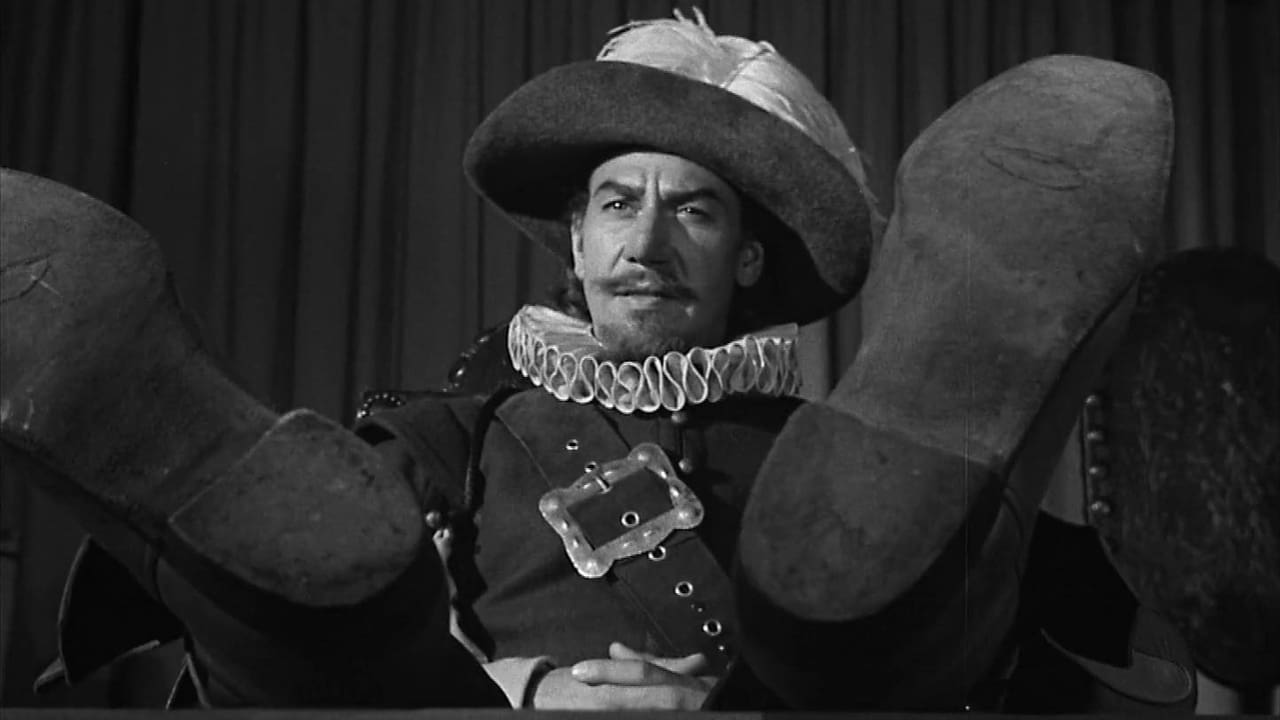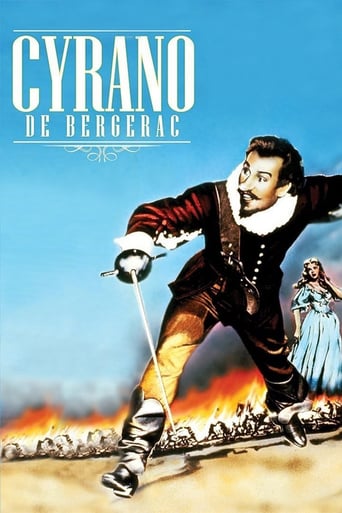

The performances transcend the film's tropes, grounding it in characters that feel more complete than this subgenre often produces.
... View MoreClever and entertaining enough to recommend even to members of the 1%
... View MoreGreat story, amazing characters, superb action, enthralling cinematography. Yes, this is something I am glad I spent money on.
... View MoreThrough painfully honest and emotional moments, the movie becomes irresistibly relatable
... View MoreI haven't read Edmond Rostand's original novel - apparently a fictionalized account of Cyrano de Bergerac's life - but Michael Gordon's* screen adaptation is a fine romp. Cyrano is the type of guy who always has something to say, especially if he wants to express his affection for a woman. José Ferrer (in an Academy Award-winning performance) portrays him as a dude who spares nothing in standing up for his honor. And damned if Mala Powers isn't a babe!The only other adaptation that I've seen is 1987's "Roxanne", starring Steve Martin as a long-nosed fire chief wooing a young student. Both that one and this one are worth seeing. "Cyrano de Bergerac" might not be the greatest movie ever, but it's fun, and that's what's important. Good one.*Michael Gordon is Joseph Gordon-Levitt's grandfather.
... View MoreBeing a big fan of the Gerard Depardieu version, I was all for seeing this film from 1950 with Jose Ferrer. And I found it excellent. I have seen more beautiful-looking films elsewhere, but the film is well shot and the costumes and sets do have a certain charm to them. Dmitri Tiomkin's music score is suitably rousing, the sword play is clever and never clumsy and the script is witty and poetic, while the story never fails to thrill or move me in the way it should do. It is well directed by Michael Gordon also. Of the acting, faring weakest was Mala Powers, she is beautiful but not much is done for me to make her beyond that. William Prince is more than adequate and Ralph Clanton sneers effectively as De Guiche. But the film, same goes with the story itself too, really belongs to Jose Ferrer. As much as I loved his performance in Moulin Rouge, it is in Cyrano De Bergerac where he is at his finest, really resonating with me by how dignified and moving he was. Overall, excellent and worth seeing for especially Ferrer. 9/10 Bethany Cox
... View MoreIt is curious that in the period that England, Scandanavia, and Russia pushed for more reality in their drama France went into a different direction. She produced two still living dramatists: Georges Feydeau the great constructor of farces, and Edmond Rostand, the last really impressive dramatic romanticist. Rostand was to write two plays that became international favorites. One was L'ANGLON ("The Eaglet"), a play about as Napoleon II, only legitimate son of Emperor Napoleon I of France. That play follows his attempt to escape the clutches of the Chancellor of Austria, Metternich, to reclaim his throne. That play was the last great role (and greatest "trouser part") of Sarah Bernhart. Because the Divine Sarah made it her favorite role L'ANGLON is rarely shown. However, a sequence from that play has appeared in one of the Judy Garland-Mickey Rooney films, when the youngsters are in a deserted old theater and pretend to be stars of the past. Garland as Bernhard recites the speech of Napoleon II (in French!) at the battlefield of Waterloo where he repeats the great victories of his father.Interestingly enough, Rooney in the same film portrayed Richard Mansfield in his performance as "Cyrano de Bergerac". He does a snippet of one of the play's high-points - the duel where Cyrano is constructing a poem that ends each verse with the words "thrust home!", until he ends the duel and the poem with the physical action against his foe matching the words.Rostand's CYRANO DE BERGERAC is constantly revived, as a tragic comedy about a great poet and swordsman/soldier, who was independent of the patronage game of the aristocracy of his time. Cyrano is fully honest, and fully prepared to criticize the hypocrisies of his days, and can protect himself due to his swordsmanship. However, he also suffers from a physical problem. He has a magnificently big nose. His swordsmanship makes it fully possible for him to confront anyone making fun of his nose: that was behind the opening duel regarding "thrust home". However, he is aware he is ugly, and it prevents him from being brave enough to offer his heart to his beloved cousin Roxane. As the play continues he learns that a new Gascon recruit in his regiment Christian de Neuvilette is the secret love of Roxane, and she asks Cyrano's assistance in getting Christian's attention about this. As it turns out Christian is equally in love with her. Christian is a brave and good looking young fellow, but he is tongue tied. The result is that Cyrano ghost writes a series of letters to Roxane (supposedly by Christian) that cements her affection for him. Cyrano's assistance eventually leads to another memorable highpoint in the play where he takes over in a moonlit garden for the nervous Christian, and serenades Roxane's ears (she is on her terrace) with his poetry, supposedly recited and created by Christian. Reading a description of the play (of any play) hardly prepares the viewer for it's stage effect. Let us just say if you have never seen this play, catch this film version, or the French one with Gerald Depardieu made in 1990. It is bittersweet, for we realize that with the growing success of Cyrano's ghosting for Christian, he is torn further and further away from ever getting Roxane from noticing him. Only at the tale end of the play, when it is too late, does the truth dawn on Roxane.In 1947 Jose Ferrer was appearing on Broadway in Cyrano de Bergerac. Ferrer was the first major star on Broadway of Puerto Rican ancestry, and proved adept at acting (he was Iago to Paul Robeson's OTHELLO), comic parts (he did a great job in a revival of CHARLEY'S AUNT), and directing. In fact, the character of "Geoffrey De Cordova" (Jack Buchanan) in the musical film THE BAND WAGON is based in part on Ferrer (also in part on Orson Welles). He dominated his production of CYRANO, and was signed to appear in the movie version in 1950. Thus we are lucky enough to see him on film recreating his stage performance. Ferrer did not overact - he seemed to instinctively know how to control that tendency by stage performers on camera. As a result he fit the cinema screen perfectly. His moments of bravura acting (as when he confronts and befuddles a rival in a dark garden by pretending he has just fallen from the moon) are neatly balanced when he realizes what he just can't get from Roxane.The others performers are not unknown types. Christian was played by William Prince (later "Young Dr. Malone" on television). Cyrano's more worldly wise friend Le Bret is Morris Carnovsky, who had a distinguished career on stage and on screen. Lloyd Corrigan played the cowardly Ragueneau (the pastry cook/poet) who feeds Cyrano and his friends, and witnesses the sequence where Cyrano beats back a set of armed thugs sent to attack the pastry cook. Mala Powers was Roxane. Even in the brief part of Cardinal Richelieu Edgar Barrier played that role (secretly admiring the swordsman who keeps sneering at him). But it is the central role that makes this play and film, and in the capable hands of Ferrer it was done well. It should have been a color film (which is why I have only given it a "9" instead of a "10"), but that doesn't weaken the film at all. Two years before Laurence Olivier won an "Oscar" as best actor for his HAMLET - really the first time a classic play role got the honor from the Academy. In 1950 the Academy gave the best actor "Oscar" to Ferrer, for the second classic play role on film, as well as the first Puerto Rican actor so honored.
... View MoreUNITED ARTISTS Corporation presents A Stanley Kramer ProductionCYRANO de BERGERAC From the play by Edmond Rostand. Adaptation by Brian Hooker (Translation) and Carl Foreman (additional dialog). Director Michael Gordon. Producer Stanley Kramer. Associate Producer George Glass. Film Editor Harry Gerstad. Original Musical Score by Dimitri Tiomkin. Cinematographer Frank Planer. Production Designer Rudolph Stenard Starring Jose Ferrer, Mala Powers, William Prince. with Morris Canovsky, Ralph Clanton, Lloyd Corrigan, Virginia Farmer, Edgar Barrier, Elena Verdugo, Albert Cavens, Arthur Blake, Don Beddoe, Percy Helton, Virginia Christine, Gil Warren, Phillip van Zandt, Eric Sinclair, Richaed Avonde, Paul Duboy, John Crawford, Jerry Paris, Robin Hughes, Francis Pierlot, John Harmon.The screen play opened up just about exactly as it was written by Monsieur Edmond Rostand in 1897. As the opening title cards and credits all roll by, we discover that we are in a theatre, Paris in 1640. The current play begins to open before a fairly full house. As the first few painfully dull lines of dialogue are spoken by the Parisian thespians, we are made aware of a boisterous heckler disrupting the dramatic proceedings.The gentleman doing the heckling turns out to be our story's main character and protagonist par excellence, Cyrano de Bergerac (Mr. Jose Ferrer). His verbal barbs continue, and he eventually confronts the playwright and theatre manager, insisting that the play be closed. Cyrano pays a generously large sum in order that the theatrical company be paid and the patrons refunded their Ticketmaster Costs.Upon his being questioned about blowing his whole bankroll in just one moment, he replies, "Yes, but what a moment!"He then is forced into a duel by another theatre patron who purposely insults him about his large nose. He composes a poem about the duel during the sword play and ends both the poem and the duel together at the precise same moment. Monsieur Cyrano, you see is a Master Swordsman and Professional Soldier, as well as a Poet. We learn of his love for the fair Roxanne (Mala Powers), a distant cousin. But he thinks that he dare not even approach her because of his grotesquely over-sized nose. Through a strange set of circumstances, he winds up schilling for one Christian de Neuvilette (William Prince), also a soldier and in Cyrano's unit.It turns out to be the same old Eternal Triangle, as Cyrano loves Roxanne, but she digs this Christian character, but so strong is Cyrano's love that he says nothing for his own interests. He instead coaches the young Christian in the poetic language of love. When the two soldiers are called to active duty at the front in wartime, it is Cyrano who writes letters to the fair Roxanne, but in Christian's name.When Christian is killed, Roxanne enters a lifetime of seclusion in a convent, but Cyrano remains mute on his own behalf; going to visit her almost daily and reading aloud "Christian's" letters to her. He maintains his secret almost to the end of his life, almost but no cigar!Just see the Film, and forget about what I've said here. The play is wonderful, the Film magic and Mr. Jose Ferrer is superb. NOTE: The cast listing shows Miss Elena Verdugo as "Orange Girl"; but the film was done in Black & White. So, how could we tell?
... View More